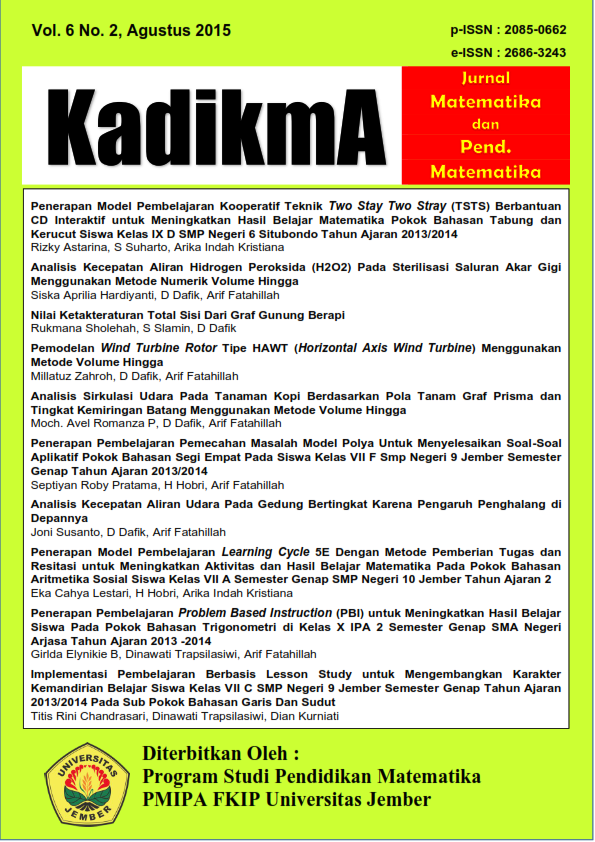PENERAPAN PEMBELAJARAN PROBLEM BASED INSTRUCTION (PBI) UNTUK MENINGKATKAN HASIL BELAJAR SISWA PADA POKOK BAHASAN TRIGONOMETRI DI KELAS X IPA 2 SEMESTER GENAP SMA NEGERI ARJASA TAHUN AJARAN 2013 -2014
Abstract
Abstract. The problem based learning model or known as Problem Based Instruction (PBI) always presents problems in real life context. This learning model has brought the students to get involved in the process of finding and investigating. The steps in this learning model were directing the students to the problems, organizing the students to learn, helping independent and group investigation, developing and presenting artifact and exhibits, and also analyzing and evaluating of problem solving. This research applied two cycles covering planning, action, observing, and reflection. The Approach used in this research was qualitative approach. This research was a Class room Action Research Design (CAR). This research design was adopted from Hopkin’s, which each cycle has four phases or steps, those are planning, action, observing, and reflection, and then continued to the following cycle. Data collection method used in this research was test, observation, documentation, and interview. Acording to the observation, the students individual activity from the first up to the fourth meeting is 69,87%, 72,22%, 74,3% and 79,72%, and the students group activity from the first up to the fourth meeting is 75,27%, 76,13%, 80,83% and 91,1%. The percentage of the students who achieved the target was 82.5%, with 7 students were failed in the first cycle. In the second cycle, the percentage of the students who achieved the target was 95% with 2 students were failed.Key Words : Problem Based Instruction, Achievements
Published
2015-08-01
How to Cite
B, Girlda Elynikie; TRAPSILASIWI, Dinawati; FATAHILLAH, Arif.
PENERAPAN PEMBELAJARAN PROBLEM BASED INSTRUCTION (PBI) UNTUK MENINGKATKAN HASIL BELAJAR SISWA PADA POKOK BAHASAN TRIGONOMETRI DI KELAS X IPA 2 SEMESTER GENAP SMA NEGERI ARJASA TAHUN AJARAN 2013 -2014.
Kadikma, [S.l.], v. 6, n. 2, aug. 2015.
ISSN 2686-3243.
Available at: <https://jurnal.unej.ac.id/index.php/kadikma/article/view/1988>. Date accessed: 29 dec. 2024.
doi: https://doi.org/10.19184/kdma.v6i2.1988.
Section
Articles


.png)
.gif)





